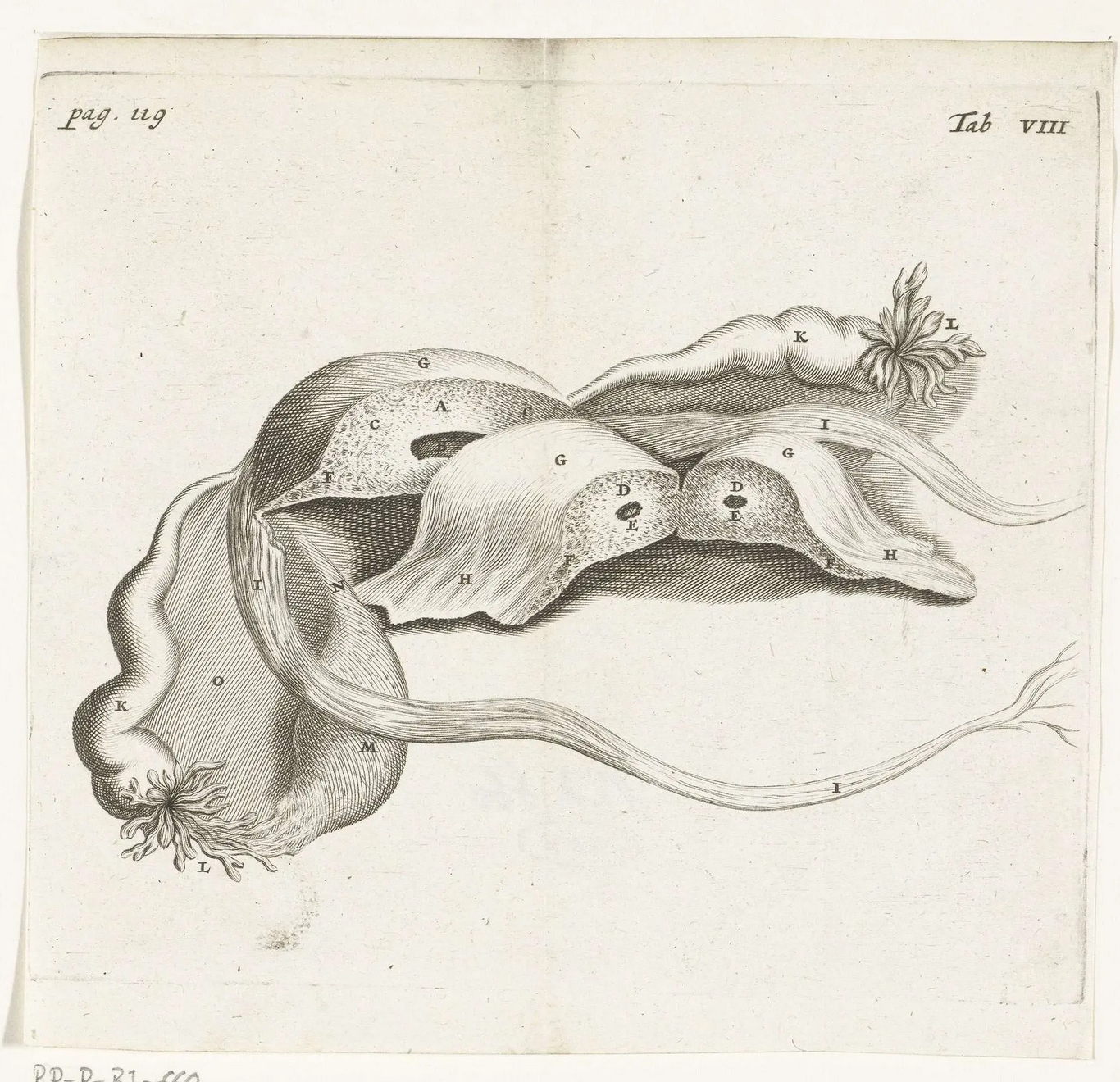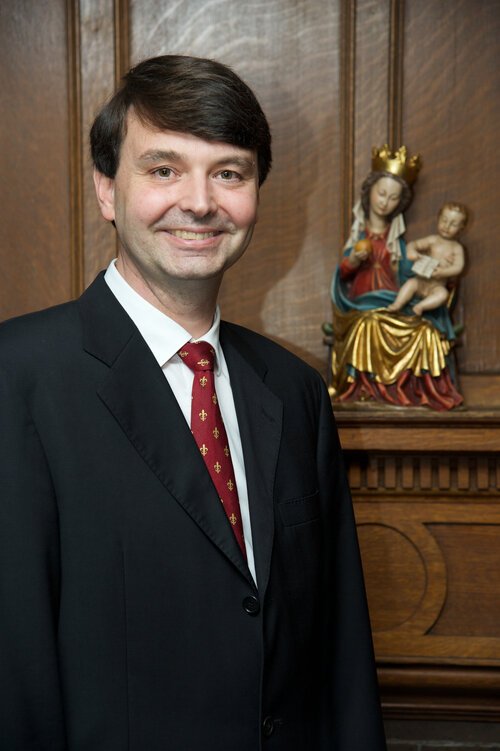Finding Better Solutions for Ectopic Pregnancies
To view a PDF of this document, click here.
Hendrik Bary, Anatomical Depiction of an Ectopic Pregnancy, 1672
A classic application of the Principle of Double Effect is the tragic case where a mother has an ectopic pregnancy, and her life is threatened by the implantation and growth of her embryo in one of her fallopian tubes. Modern medicine has yet to find a solution that enables the baby to survive. Some interventions involve directly killing the embryo. These fall into the category of a direct abortion and cannot be done ethically. Surgically removing the section of the fallopian tube (salpingectomy) in danger of bursting — to prevent a life-threatening hemorrhage — can be justified as ethical treatment in cases where there is no way to save the embryo and the intervention does not directly attack its physical integrity. The same action would be justified if the fallopian tube were in danger of bursting from another cause, as one obviously has an ethical imperative to do everything that can be morally justified to save the life of the mother.
From a Catholic perspective, the problem of ectopic pregnancies is crying out for a better solution. Secular medical professionals and ethicists see methotrexate as the answer since it can preserve fertility by killing the embryo and flushing him or her out without destroying the fallopian tube. As mentioned above, however, the Church affirms that any direct attack on the life of the embryo constitutes an abortion and cannot be morally allowed. The Ethical and Religious Directives for Catholic Health Care Services states in directive 48. “In case of extrauterine pregnancy, no intervention is morally licit which constitutes a direct abortion.”
So, what other possibilities exist? Dr. Cara Buskmiller, a physician fellow of The National Catholic Bioethics Center, is doing scientific research to find ways to save the life of the embryo in ectopic pregnancies. She published an article entitled; “Transuterine relocation of pregnant uterine horn segment in an exploratory rat model with implications for tubal ectopic pregnancy.” In it she points to a possible solution.
Ectopic pregnancy affects ~ 2% of pregnancies annually in the United States, with no current treatments allowing for the continuation of the pregnancy. Thus, this study sought to initiate an investigation into the potential design of a surgical technique, in an animal model, that could serve as a foundation for future research into the potential of relocating an ectopic embryo into the uterus at the human level.
Since ectopic pregnancies can create medical emergencies, the only ethical way to do this kind of research is to start with animals. Once successful techniques have been created and reliably tested, then human trials could begin.
I am reminded of the problem of impacted or obstructed labor where the fetus is stuck in the birth canal. In the past this could be a death sentence for both child and mother. Doctors or midwives who did not manage to force the passage of the child would, as a last resort, perform a craniotomy, essentially taking the skull of the baby apart so as to extract the body and save the mother. The teaching authority of the Catholic Church condemned this practice as a direct abortion. Secular thinkers said that Catholic leaders had no compassion for saving the lives of mothers who would die without craniotomies, but Catholic doctors and others got to work looking for a way to save both the mother and child. They hit upon the cesarean or C-section. This surgical technique has saved the lives of huge numbers of babies, and not only those with impacted labor but in many other situations. I am alive today because my mother received an emergency C-section. The moral of this story is that taking a strong ethical stand can motivate medicine and science to find better solutions.
Dr. Buskmiller and her colleagues were successful in this preclinical study at relocating several rat embryos from one part of the uterus to another. This was not a situation of ectopic pregnancy, but it did show that taking an embryo from one spot and putting it in a different part of the uterus is a potentially viable technique. The authors believe that further studies with higher animals, such as sheep or baboons, could lead to results that more closely mimic the situation of a human ectopic pregnancy.
What strikes me as an ethicist is that only Catholics and those with an ethical understanding of the dignity and value of human embryonic life are pursuing these advances in scientific methods. Most secular doctors and scientists are perfectly happy sacrificing endless numbers of human embryos in order to preserve the health and lives of their mothers. With that same attitude, there would have been no drive for improvement in medical techniques like the C-section many decades ago.
I recall a case where a pregnant mother in California had a preborn child with multiple health problems. Her doctor advised her to abort the baby. She refused saying that she would not kill her baby. The doctor was nonplussed. He did not know what to do. Neither he nor his colleagues had ever accompanied a pregnancy with so many problems. They were medically ignorant of what could be done to help the mother and child because their only solution was abortion. Fortunately, the mother did find a pro-life doctor who helped her through the pregnancy. Her child survived to birth and was baptized before dying in the loving embrace of her parents. It is the culture of death that exhibits a lack of scientific drive and is resigned to tragic tradeoffs involving killing. The culture of life pushes for scientific development and compassionate ethical solutions.
Joseph Meaney received his PhD in bioethics from the Catholic University of the Sacred Heart in Rome. His doctoral program was founded by the late Elio Cardinal Sgreccia and linked to the medical school and Gemelli teaching hospital. His dissertation topic was Conscience and Health Care: A Bioethical Analysis. Dr. Meaney earned his master’s in Latin American studies, focusing on health care in Guatemala, from the University of Texas at Austin. He graduated from the University of Dallas with a BA in history and a concentration in international studies. The Benedict XVI Catholic University in Trujillo, Peru, awarded Dr. Meaney an honorary visiting professorship. The University of Dallas bestowed on him an honorary doctorate in Humane Letters in 2022.


